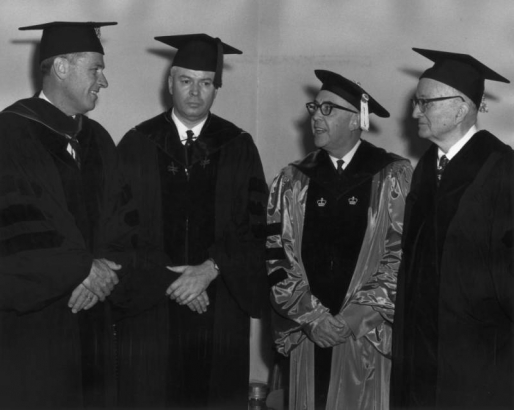The Denver Public Library's Western History and Genealogy Collection is a massive accumulation of resources aimed at serving the needs of academic researchers, authors, historians, genealogists and others who are interested in learning more about Colorado and the American West.
Some resources, such as our vast Genealogy Collection, are kept on open shelves and are easily accessible to anyone who walks through the door. Other parts of the department, such as our thesis and dissertation collection, take a bit more effort to find. But for those researchers who are willing to do a little extra digging, our collection of theses and dissertations is an absolutely invaluable resource for finding research on a variety of Western and Colorado history topics.
What's the Difference Between a 'Thesis' and a 'Dissertation'?
It's worth taking a moment to point out the difference between a thesis and a dissertation. The differences here are subtle, but important. A thesis is a paper that's presented by a student as part of the process of receiving a master's degree. A thesis is normally designed to showcase a student's mastery of a subject and the resources available for researching that subject. (Thanks to a remarkably robust History Department at the University of Colorado Denver, our collection is packed with theses from local students that concentrated on local subjects.)
A dissertation, on the other hand, is presented by PhD candidates and normally emphasizes original research with an original thesis statement. Because they emphasize original research, dissertations can frequently pull far ahead of mainstream research and publishing. A great example of this is Jim Rudolph's 1974 dissertation, The Butch Camp: A Study of Communication in Two Denver Gay Bars. Rudolph's work came at a time when LGBTQ Studies were far off the radar of mainstream academia and preserves a moment in Denver LBGTQ history that may have otherwise been lost.
Similarly, we're seeing an increasing amount of thesis and dissertation work being on recent immigrant communities, such as Somalian and Ethiopian communities. These early research snapshots of these communities are an invaluable resource for future generations of researchers.
What's the Value of These Materials?
Besides presenting original research and new takes on existing resources, theses and dissertations can be counted on to provide thoroughly vetted research resources. Both types of papers are examined by professors and committees dedicated to make certain that the work they're presenting is both thorough and accurate.
How to Find Theses and Dissertations at DPL
Most of the theses and dissertations are on microfilm, which is housed in closed stacks. However, all of these items are all cataloged and finding them is possible if you simply add the term "thesis" or "dissertation" to your original search terms. Of course, librarians are always happy to help researchers look through the catalog.
Once you've found the thesis or dissertation you're looking for, request it at the reference desk, and shelvers will deliver the item to the Mullen Reading Room. If the item is on microfilm, we have six microfilm readers, which all accept USB drives, and our staff will gladly show you how to use them.
Finally
The collection of theses and dissertations in the Western History and Genealogy Department is treasure trove of useful information that's frequently overlooked by casual researchers. But if you're looking to take your own research efforts to the next level, we strongly suggest that you avail yourself of this valuable resource.


Add new comment